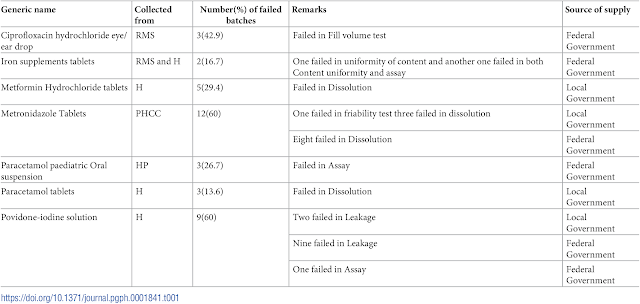Nepal's public health care facilities are facing a significant challenge in ensuring the quality of essential medicines, according to a nationwide study conducted by a team of researchers. The study, which aimed to assess the quality of essential medicines available in public health care facilities across the country, uncovered alarming findings that raise concerns about public health and the effectiveness of medication.
A research was conducted with titled "Assessment of quality of essential medicines in public health care facilities of Nepal: Findings of nationwide study" was conducted by Neelam Dhakal, Pradip Gyanwali, Baburam Humagain, Rajendra BC, Nisha Jha, Phoolgen Sah, Amita Pradhan, Meghnath Dhimal, and Anjani Kumar Jha.
The study employed a cross-sectional descriptive
design, covering 21 districts across all three ecological regions of Nepal.
Data collection took place from June to October 2018, with one district's data
collection delayed until April 2019 due to logistical challenges. Face-to-face
interviews with health facility in-charges and observation checklists were used
to assess medicine procurement, storage conditions, and other related factors.
Drug samples were collected from various health facilities and subjected to
rigorous testing at the National Medicine Laboratory (NML).
The study's findings highlight the urgent need for
concerted efforts to improve the quality of essential medicines in Nepal's
public health care facilities, ultimately ensuring the provision of safe and
effective healthcare to the population.
Essential medicines are crucial in meeting the
primary health care needs of the population. However, if these medicines are of
poor quality, they can have serious implications for public health. The study,
carried out in 62 health facilities across 21 districts, encompassing all seven
provinces of Nepal, shed light on the current state of essential medicines in
the country.
Among the key findings, the study revealed that
only 13% of the health facilities surveyed were found to follow the recommended
medicine storage guidelines. This indicates that the majority of health
facilities are not adequately protecting essential medicines from factors such
as sunlight, humidity, and heat, which can degrade their quality. Proper
storage conditions are crucial for maintaining the efficacy and safety of
medications.
Additionally, out of 244 batches of 20 different
generic medicines collected for testing, a concerning 15.2% (37 batches) were
found to be substandard. The substandard medicines included various essential
drugs such as Ciprofloxacin hydrochloride eye/ear drops, Iron supplement
tablets, Metformin Hydrochloride tablets, Metronidazole tablets, Paracetamol
oral suspension and tablets, and Povidone Iodine solution. These findings raise
serious concerns about the quality and effectiveness of essential medicines
available in public health care facilities.
The researchers recommend urgent action by the
Government of Nepal to prioritize ensuring the quality of essential medicines
in the country. Steps should be taken to improve medicine storage practices in
health facilities, including providing guidelines and training to ensure proper
temperature control, humidity regulation, and overall storage conditions.
Efforts to enhance quality control mechanisms and strengthen regulatory
oversight are also crucial to address the issue of substandard medicines.
The study emphasizes the importance of maintaining
the quality of essential medicines to safeguard public health and underscores the
need for comprehensive measures to address this pressing issue. By ensuring the
availability of high-quality essential medicines, Nepal can significantly
contribute to improving healthcare outcomes and promoting the well-being of its
citizens.
